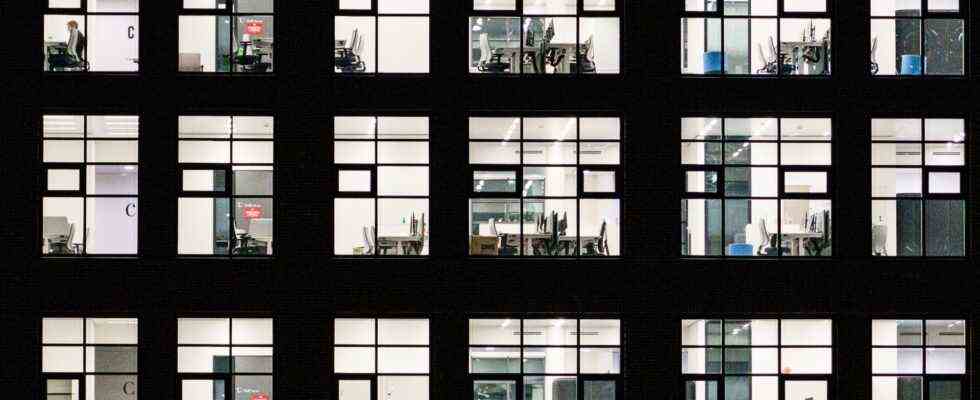Status: 04.02.2022 08:11 a.m
The pandemic has radically changed the way we work. Many employees have been doing their job from their home office for months. Whether they will ever return to the old office is not certain. Because companies are rescheduling.
A high-ceilinged, two-level open space: home-made office desks, a few team offices, and cramped phone booths. Young people are sitting at their laptops everywhere, working here as start-up founders and freelancers. Event agency Planworx recently rented six office spaces in the Munich co-working space “Impact Hub”. This is cheaper and more flexible than having your own physical company headquarters, which they used to have.
Managing Director Christian Münch is convinced that the office in its classic form is obsolete. Münch made his experiences with the classic office. Together with his business partner Chris Boehm, he founded Planworx in 1989 and the company expanded rapidly. With 50 employees, they moved to a hip event location on Munich’s Praterinsel.
Coworking space instead of hip headquarters
At some point, however, it became clear that cramped offices and large computers make work processes cumbersome and inflexible. After two more moves, Planworx arrived in the coworking space two months ago – and now only needs six permanent jobs because most employees work from home.
Just two years ago, says Münch, his customers from the IT and automotive sectors would have insisted that the presentation be held on site, even for the smallest projects. Münch and three or four employees traveled to Wolfsburg or Hamburg. There have been no more trips since the pandemic, the teams present from the home office. “And the customer is also happy to stay in his home office.”
Outdated centers as an image problem
Planworx has decided to take a radical step and deleted the company headquarters. But other companies are also changing. In fact, individual sectors in Germany are already reducing their office space – banks and insurers, for example.
Nevertheless, the overall demand for office space will increase, believes Markus Trost from real estate consultants Jones Lang LaSalle, or JLL for short. After all, companies are expanding and new specialists are being sought everywhere. If they are hired, they would be assigned a physical place of work. “And that means additional space is required,” says the Munich branch manager of JLL.
At least that applies to cities like Berlin and Munich. However, outdated company headquarters could become an image problem because they often embody an outdated corporate culture. In order to fight for the best specialists in the “war for talent”, more and more companies are willing to move to more attractive city quarters.
Wacker Chemie, for example, has decided to relocate its company headquarters from Munich-Neuperlach to the hip Werksviertel in the east of Munich, to rented rooms that are more economical and smarter and “enhance the well-being of employees and enable them to work together,” as the specialist portal Immobilienmanager puts it. de means.
Virtual meetings with VR glasses
Also soon from yesterday: large assembly halls and meeting rooms. According to JLL manager Trost, digitization has contributed to the fact that home office meetings have become part of everyday life. In the next step, larger meetings could also take place virtually, with the help of VR glasses.
That, says Trost, could look like “you’re sitting around a meeting table and nobody’s physically there. You can look at documents together. You can look people in the face, with a high resolution, so that you’re really close to the are reality, but are actually traveling in a digital world.”
Nice new working from home? As expected, Verena di Pasquale from the German Federation of Trade Unions in Bavaria has more in mind the protection of employees and the risks of digital or virtual work. Of course, employees working from home need a good workplace, she says. “That means that occupational safety and health protection must also be guaranteed there. And the employer must also make his contribution.”
“We long to meet”
At the event agency Planworx, satisfaction with the home office is extremely high. The agency offers its employees a surcharge of a good 40 euros per month. In the monthly surveys that Managing Director Münch conducts among his employees, only ten percent say they need the company as a place for exchange. However, Münch and his business partner are planning events where employees can meet again in person.
“We thirst for exchange, for recognition, for encounters,” says Münch. Especially with the extremely high home office quota, the social component should not be neglected. JLL real estate consultant Trost expects that the home office will remain and that the physical offices will change significantly – away from the individual office towards innovative workplaces, “where knowledge can be exchanged and innovations can be developed together”. That, according to Trost, is the challenge for future working environments.

